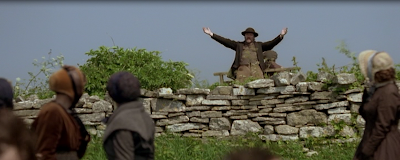I just watched Episodes 1 and 2 of the 2008 version of Tess of the D'urbervilles and have taken it upon myself to write a recap. Why have I chosen to do such a foolish thing? Because, mes amies, I need space to vent and spew out my spiraling emotions. And as seeing psychiatrist would send my bank account into a fit of apoplexy ( not to mention the poor psychiatrist), I decided to do a little DIY therapy: writing style.
First of all I would hereby like to state that contrary to my usual habits, I watched the series before reading the book. And now that that confessional is done, let's turn back to business.
The titular heroine Tess Durbeyfield ( an enchantingly lovely Gemma Aterton) is embarrassed by her father Mr. Durbeyfield, who is elated to discover that he is the descendant of a very old and illustrious family that went by the posh name of "D'uberville. I must say I really feel for Tess here. She can't help loving her father and sinking even further into embarrassment under the weight of that love. Her mother ( played to perfection by Ruth Jones) is an opportunist of the highest level, even more thrilled than her husband at this piece of news, and presenting a spoon with the family crest on it as evidence.
 |
| That spoon looks more like a ladle to me. But anyways... |
Moving on... one night Tess gets into an accident as she is carting the family's beehives to the market. Unfortunately her family's horse is fatally injured, and is shot to put it out of its misery. Poor White Beauty. The loss of the animal deals a blow to a family that is already financially constrained, and Tess's mother persuades Tess to trot off to the D'urberville chateau to
 |
| Alec tries to seduce Tess with strawberries... FAIL |
Alec proposes hiring Tess as the new poultry manager as their last girl disappeared mysteriously, and he has no problem persuading his old, invalid mother, Mrs. D'urberville to do so. Mrs. D'urberville is blind and has a love for birds that is tantamount to obsession. Having no love left over for her son ( rightly, I say) she likes to push his buttons by reminding him that he really isn't a D'urberville and that his father, whow as called Stoke, took on the D'urberville name because he thought it would raise him in polite society. Shocker! So Alec isn't a D'urberville after all??
 |
| Her expression is priceless... priceless! |
 |
| A library?? Drool alert! Drool alert! |
Tess might be innocent, but she's not stupid. Alec's attempts merely increase her distrust of him, and unable to secure her willing consent to be seduced, he rapes her.
ARRRRRRRRRRRRRRRRRRRRRRRRRRGGGGGGGGGGHHHHHHHHHH
I hate this man so much for destroying Tess, that I can't think straight. Must go dunk my head in a bucket of ice-water.
Tess leaves and Alec has the nerve to run after her and ask her to be his mistress. WHAT is wrong with you?? You've destroyed her life and now you want to make it worse? Creep. Tess informs him that she can never love him. She doesn't even hate him for what he's done to her. He's nothing but dust and ashes to her now. You tell 'im sista!
Alec's too lazy to push her further ( I think he's done quite enough of that already), and a broken-hearted Tess returns home. She tries to keep a brave face towards her siblings, but breaks down and confesses the truth to her parents. She asks her mother why she never warned her against such things. Yeah, Mrs. Durbeyfield. You were so greedy for money you destroyed your daughter's life. When Mrs. D tries to blame Tess, Tess rises up and cries out that she never read all the novels that explained such behaviour, that she was only seventeen, an innocent child. It's achingly sad to hear Tess herself acknowledging that her innocence has been destroyed. As the weeks go by, Tess retreats more and more into the shadows of her dingy house, unable to sit for more than two minutes without crying, the freedom and sweet naivete that came with her innocence forever destroyed.
Comments
 I'd mentioned before that Tess of the D'urbervilles reminded me strongly of Samuel Richardson's novel Pamela. Written in the eighteenth century, Pamela chronicles the story of a beautiful servant girl harassed by her master. When seduction fails to affect Pamela's virtuous heart, her master tries to rape her and eventually kidnaps her in order to keep her under his power. Like Tess, Pamela is somewhat educated, and the fact that seems not to belong to any particular stratum of society is a theme echoed by Tess. These girls are not merely servants, but characters, with thoughts, feelings and aspirations. Pamela fears for her virtue, Tess does not, but loses something even more precious: her innocence.
I'd mentioned before that Tess of the D'urbervilles reminded me strongly of Samuel Richardson's novel Pamela. Written in the eighteenth century, Pamela chronicles the story of a beautiful servant girl harassed by her master. When seduction fails to affect Pamela's virtuous heart, her master tries to rape her and eventually kidnaps her in order to keep her under his power. Like Tess, Pamela is somewhat educated, and the fact that seems not to belong to any particular stratum of society is a theme echoed by Tess. These girls are not merely servants, but characters, with thoughts, feelings and aspirations. Pamela fears for her virtue, Tess does not, but loses something even more precious: her innocence.Tess's innocence must not be confused with empty-headed naivete. She might not have been fully awakened to Alec's nefarious plans, but the fact that she distrusts him is evident even to him. Alec's callous disregard for everything except his carnal appetite ends up ruining the life of a girl whose life will obviously never be the same again. Had Tess been a Viscount's daughter, things might have turned out differently for her, but her birth condemns her to the fringes of society where no one will even think of advocating for her.And why should anyone advocate for her? Has what Alec has done a terrible crime?
Uh, YES. Not only is rape a terrible and disgusting act, but in Tess, it destroys her sweet innocence, robbing her of something she can never get back. Not only does this loss permanently alter her character, but it also thrusts her into a realisation of a dangerous, unforgiving world. Perhaps she should have had this realisation a long time ago, for with it she would have never allowed herself to fall into Alec's clutches. But such speculation is nothing finer than a waste of time, and I will close this recap with a reminder of that verse in the Bible which tells us to be "as shrewd as snakes and as innocent as doves." I used to think that that was an odd oxymoron, but after Tess, I can see how this advice is useful.
Performances
Gemma Arterton- I loved her portrayal of Tess. It hit all the right notes without making me feel the tiniest bit of annoyance towards her. I remember reading Pamela, and wanting to throw a shoe at the heroine for being so idiotic and simpering. I like Tess's spunkiness and intelligence. Hooray for intelligent heroines!
Hans Matheson- His Alec D'urberville is so convincing, I have to keep reminding myself that he is an actor and is only playing a role . He is at once infuriating, hateful, mocking and pitiable. For all he's done, I cannot bring myself to hate him. Like Tess I can only scorn and pity him.
Ruth Jones- Her Mrs. D'urberville is an interesting character, for she will literally sell her own daughter in order to keep the family's heads afloat. Her barely-concealed obsession with financial security and her pathetic pride in the D'urberville name bar her from ever being a good mother to Tess. I largely blame Mrs. D'urbeville for what happened to Tess. A good mother would have been very concerned over where her daughter was going off to work, especially if she was alone and defenseless. Was Mrs. D'urberville a bad mother, or was she a good one twisted by her circumstances?
That's it for my first recap! I'm looking to finish recapping all four episodes. It's going to be uphill work, especially with a somber drama like Tess, but I'm hoping there'll be little moments of levity to lighten the burden.

























